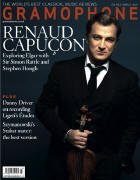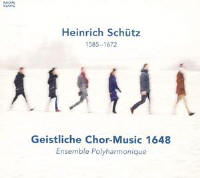Texte paru dans: / Appeared in: |
|
|
Outil de traduction (Très approximatif) |
|
|
Reviewer: David Vickers Geistliche ChorMusic (Dresden, 1648) was designed to prove the essential requirement of a full knowledge of the science of contrapuntal techniques. Schütz’s preface observed: ‘If these Requisita are missing, not one single composition can succeed (even if this may sound as though it were celestial harmonies to those ears not properly trained in music), or indeed be valued much more highly than a hollowed-out inedible nut.’ He advised that these motets can be sung by choirs big or small, unaccompanied or with organ continuo, or with additional instruments playing some of the choral lines. In other words, the motets are malleable to variable circumstances. The six singers of Ensemble Polyharmonique, directed by countertenor Alexander Schneider, perform 12 of the 29 motets. Performing at high pitch (A=468Hz), and accompanied discreetly by violone and chamber organ (tuned to mean-tone), they convey refined flexibility of timbres that serve the rhetoric of the biblical poetry. The increasing sense of marvel in Die Himmel erzählen die Ehre Gottes (SWV386), solemn lamentation of Die mit Tränen säen (SWV378), shifting contrapuntal lines of John the Baptist’s words in Ich bin eine rufende Stimme in der Wüsten (SWV383) and poignant mournfulness of Selig sind die Toten (SWV391) all feel spot on. Moreover, the interpolation of three duets from Kleiner geistlichen Concerten (two volumes published in 1636 and 1639) injects welcome variety of scale and style – such as ardent tenors Johannes Gaubitz and Sören Richter in Eins bitte ich vom Herren (SWV294) and the sensual piety of sopranos Magdalene Harer and Joowon Chung in Erhöre mich, wenn ich rufe (SWV289). No two interpretations in the discography are exactly alike in approach and choices. Ensemble Polyharmonique’s supple transparency of shaded texts and intimate harmonic chiaroscuro provide an illuminating alternative to the varying larger proportions of complete sets by Tölzer Knabenchor (Capriccio, 1999), Bach Collegium Japan with a consort of viols (BIS, 6/98) and Dresden Chamber Choir switching between soloists and choir, accompanied by strings, dulcians, trombones and assorted continuo (Carus, 8/11). |
|




